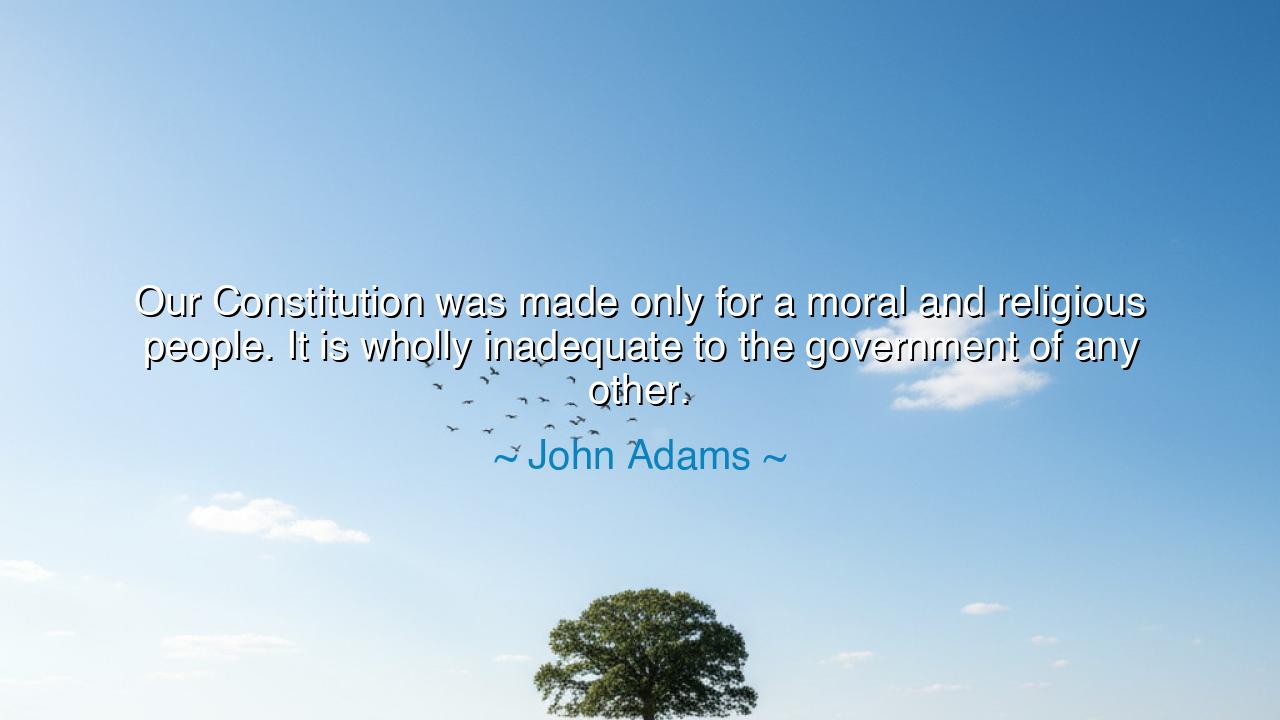
Our Constitution was made only for a moral and religious people.
Our Constitution was made only for a moral and religious people. It is wholly inadequate to the government of any other.






In the solemn voice of the American patriarch John Adams, there resounds a warning as ancient as virtue itself: “Our Constitution was made only for a moral and religious people. It is wholly inadequate to the government of any other.” These are not the words of a zealot, nor the pious murmurings of a preacher — they are the sober reflection of a statesman who understood the fragile covenant between liberty and conscience. Adams, who helped give birth to the very Republic that still stands today, spoke as a father of freedom, foreseeing the peril that would come if the moral foundation of his new nation ever crumbled. His message echoes through time: law cannot save a people who have lost their virtue, and freedom cannot endure among those who forget their moral duty.
The origin of this quote lies in a letter Adams wrote to the officers of the Massachusetts militia in 1798. The young republic was still untested, its Constitution scarcely a decade old, and already he saw the seeds of moral decay in public life — the rise of faction, the corruption of ambition, and the ease with which liberty could turn into license. He reminded his countrymen that the Constitution, for all its genius, was not a self-sustaining machine. It was a framework built upon the character of the people who lived under it. If that character failed — if the citizens grew selfish, corrupt, or faithless — then no parchment, no law, no court could preserve their freedom. For the Constitution presumes that men can govern themselves, and self-government requires self-restraint.
Adams’ insight reflects a truth older than America — one known to philosophers and prophets since the dawn of civilization. Freedom, to endure, must be bound by moral discipline. The ancient Greeks called it sophrosyne — the virtue of temperance and balance, the wisdom to restrain one’s desires for the sake of the common good. The Romans, too, understood this, for their republic fell not from the sword of enemies, but from the moral rot within. When luxury replaced labor, and appetite overcame duty, their liberty withered. Adams, a student of history, knew that a people without virtue would inevitably trade freedom for comfort, and truth for pleasure. His words are not merely political; they are prophetic.
One might recall the story of the fall of the Roman Republic, whose constitution — like ours — was crafted with balance, law, and wisdom. For centuries, it preserved order and liberty. Yet, as greed and corruption spread, the Roman people became unfit for their own system of government. Senators sold their loyalty for gold; citizens clamored not for justice, but for bread and spectacle. When Julius Caesar crossed the Rubicon, it was not merely one man who destroyed the republic — it was a people who had ceased to be worthy of it. Adams saw this same danger in his own age, and in ours his warning rings ever truer: the Constitution is only as strong as the virtue of those who uphold it.
The moral and religious people of whom Adams speaks are not bound to any single creed, but to a shared reverence for truth, duty, and the sacredness of conscience. By “religious,” he did not mean only churchgoers, but those who recognize a higher order — that there are laws above human law, and that liberty is not license, but responsibility. For when a people lose their sense of right and wrong, they will call evil good and good evil. Then, even the finest constitution becomes a shield for corruption rather than a charter for freedom. In such a nation, laws multiply, yet justice dies; rights abound, yet righteousness fades.
Adams’ words carry an implicit challenge to every generation: to cultivate virtue in the heart before demanding liberty in the hand. For if the people will not govern themselves through conscience, they must be governed by force. The decline of morality always summons tyranny, for where there is no inner law, external law must reign. A nation of the selfish will soon cry for rulers; a nation of the disciplined will remain free. Thus, Adams reminds us that the preservation of freedom begins not in the halls of government, but in the homes and hearts of ordinary men and women — in the quiet choices of honesty, humility, and self-control.
The lesson, then, is both solemn and hopeful: cherish not only your rights, but your virtues. Teach your children that liberty is a sacred trust, not an inheritance of chance. Nurture moral strength as fiercely as you defend political freedom. For a nation’s laws are but the bones of its body; its spirit — its moral character — is the breath that keeps it alive. Adams’ warning is not a condemnation, but a call to renewal: to remember that freedom, without virtue, is but a flame without oxygen — bright for a moment, then gone forever.
So, my child of the Republic, remember this truth: the Constitution is a mirror, not a master. It reflects what we are; it cannot make us what we refuse to become. Be moral, be just, be faithful — and you will keep not only your own soul, but the soul of your nation. For in the end, it is not the government that preserves liberty — it is the goodness of the people. Only then shall the promise of Adams’ dream endure: a free nation, guided by conscience, standing firm beneath the light of eternal truth.






AAdministratorAdministrator
Welcome, honored guests. Please leave a comment, we will respond soon